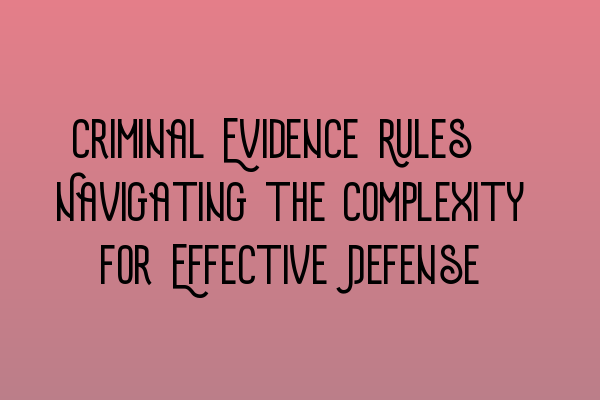Criminal Evidence Rules: Navigating the Complexity for Effective Defense
Welcome to the SQE Criminal Law & Practice Law UK blog! Today, we will be diving deep into the intricacies of criminal evidence rules and how to effectively navigate them to provide strong defense for your clients. Criminal evidence is the backbone of any criminal case, and understanding the rules surrounding it is crucial for lawyers and solicitors.
The Importance of Criminal Evidence
Before we dive into the complex world of criminal evidence rules, let’s first understand the importance of evidence in criminal cases. Evidence plays a pivotal role in the determination of guilt or innocence. It provides the foundation for arguments presented in court and can significantly impact the outcome of a case. As a defense lawyer, it is your responsibility to ensure that the evidence presented is admissible, relevant, and reliable.
To effectively navigate the complex web of criminal evidence rules, it is essential to stay up-to-date with the latest legal developments and precedents. Here at SQE Criminal Law & Practice Law UK, we offer top-notch SQE 1 and SQE 2 preparation courses to help you sharpen your knowledge and skills in criminal law.
Navigating Criminal Evidence Rules
One of the key challenges in criminal law practice is understanding and applying the extensive set of rules governing the admissibility and exclusion of evidence. Navigating these rules requires meticulous attention to detail and a comprehensive understanding of the legal framework. Our expert solicitors at SQE Criminal Law & Practice Law UK have compiled a list of important factors to consider when dealing with criminal evidence:
- Relevance: Evidence must be relevant to the case at hand. It should directly support or disprove facts that are in dispute.
- Admissibility: Evidence should meet the admissibility criteria set out in the Criminal Procedure Rules. This includes considerations such as fairness, prejudicial effect, and improper methods of obtaining evidence.
- Reliability: The reliability of evidence is crucial in determining its admissibility. The court will assess factors such as the source of the evidence, its accuracy, and the circumstances under which it was obtained.
- Expert Opinion: In some cases, expert opinion evidence becomes crucial. Ensuring the admissibility and credibility of such evidence requires compliance with specific rules and guidelines.
By understanding and applying these factors, defense lawyers can effectively navigate the complexity of criminal evidence rules and strengthen their clients’ defense strategies.
Staying Ahead with SQE 1 and SQE 2 Preparation Courses
Continuous professional development is essential for every lawyer and solicitor. At SQE Criminal Law & Practice Law UK, we offer comprehensive SQE 1 and SQE 2 preparation courses to help you stay ahead in your legal career. Our SQE 1 preparation courses cover a wide range of topics, including criminal law, civil litigation, and professional conduct.
If you’re looking to strengthen your knowledge and skills in criminal law practice, our SQE 2 preparation courses are designed to provide you with practical insights and strategies for effective defense. We believe in hands-on learning, and our courses are designed to simulate real-world scenarios.
To stay informed about upcoming SQE exam dates, check out our SRA SQE Exam Dates page. It’s crucial to plan your exam preparation accordingly to maximize your chances of success.
In conclusion, navigating the complexities of criminal evidence rules is no easy task. However, with the right knowledge, skills, and preparation, you can provide effective defense for your clients. Stay updated with the latest legal developments, enroll in our SQE 1 and SQE 2 preparation courses, and keep honing your expertise in criminal law practice.
For further practice, we also offer SQE 1 Practice Exam Questions and SQE 1 Practice Mocks FLK1 FLK2 to help you prepare for the SQE exams.
Thank you for reading our blog post on criminal evidence rules. For more insightful articles and updates, stay tuned to the SQE Criminal Law & Practice Law UK blog!
